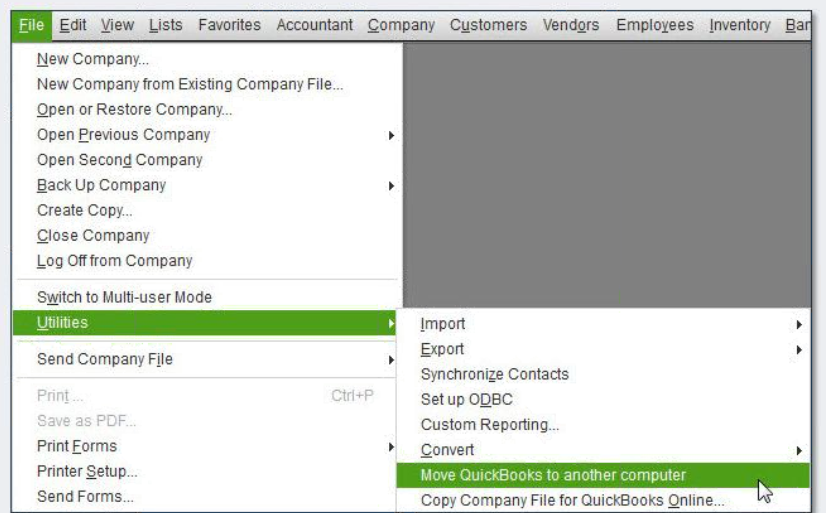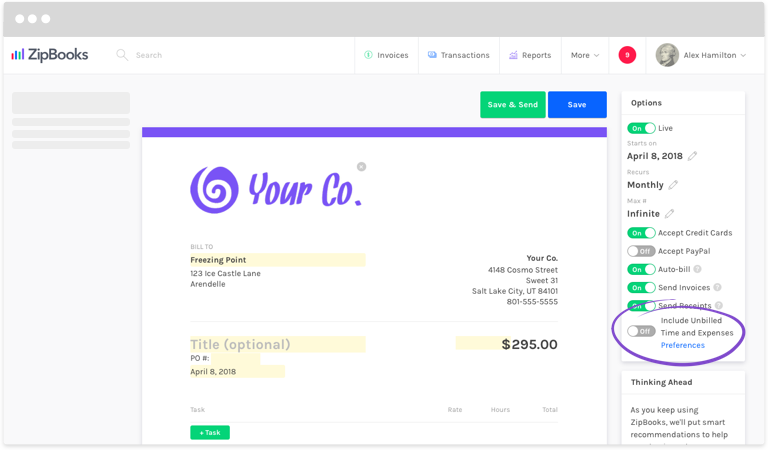by Zipbooks Admin
QuickBooks Online Backup: How to do it

The data you store in QuickBooks is crucial for running your business, managing your finances and paying your taxes. Most QuickBooks users depend on some sort of online backup for their data security and peace of mind.
In this article, we’ll delve into some of the minutiae of backing up QuickBooks data—both Desktop and Online. But first, let’s cover some of your basic questions. Note: there will be some repetition in the FAQs; scroll down to read more in-depth answers to every question.
I. FAQs
How do I set up QuickBooks Online Backup?
- QuickBooks Online Backup is now Intuit Data Protect. It is included with Pro Plus, Premier Plus and Enterprise Plans. Follow the step-by-step instructions below to activate your data protection plan or purchase Intuit Data Protect through QuickBook’s app store.
- QuickBooks Online Backup is only available for QuickBooks Desktop accounts. QuickBooks Online accounts must set up a backup through a third-party app or export data manually (see below)
How much is QuickBooks Online Backup?
- Intuit Data Protect starts at $4.95/month for one company plan. Data Protect is included with some Desktop plans at no additional cost.
- If you’re a QuickBooks Online user, protection plans vary based on the app you choose. Most plans average around $10/month or $5/month for Accountants.
How do I set up automatic backup in QuickBooks?
- First, you need to activate Intuit Data Protect through your Desktop account. Then, your data will back up automatically, once a day, every day.
What is the best way to backup QuickBooks?
- The preferred backup for QuickBooks Desktop users is Intuit Data Protect. QuickBooks Online users typically export data manually or utilize a third-party app.
How do I export from QuickBooks Online?
- You can export data manually by viewing a report, selecting the Export icon and selecting “Export to Excel” or “Export to PDF” (see below)
II. QuickBooks Desktop Backup Options
QuickBooks Desktop users are accustomed to creating routine local backups in order to protect their data security. However, there are many online options now available in QuickBooks 2019 and other Desktop version, some that integrate directly with the software.
Intuit Data Protect
Intuit Data Protect is QuickBook’s favored offering for online backups. Data Protect is a new, subscription-based service that fully integrates with QuickBooks Desktop versions 2016 and later.
The program runs automatically, once a day. You can manually backup your files using Intuit Data Protect by selecting “Back up now.” Your computer needs to be on for Intuit Data Protect to run, but if you miss a scheduled backup, the program will run automatically when the computer boots back up.
Intuit Data Protect shows status alerts on your QuickBooks Desktop homepage, notifying you of recent backups and any incomplete or failed backup files. You can view your backup history by date and time and store up to 45 days of backups.
Intuit Data Protect backs up all QuickBooks files related to your company (templates, letters, logos and images), any files that have been attached in QuickBooks, your Financial Statement Designer, Cash Flow Projector, Business Planner, and Loan Manager files. If you opt for the larger plan, you can also use Intuit Data Protect to backup any files on your computer.
How much does Intuit Data Protect cost?
- Company Data Plan: If you only need to back up one QuickBooks Company file, Intuit Data Protect costs $4.95 monthly or $49.95 annually.
- Entire PC Plan: If you are going to use Intuit Data Protect to back up your entire PC (Intuit’s preference), you are charged $9.95 monthly or $99.95 annually. This plan includes 100 GB of storage and 45 days of stored backups.
If you have opted for the “Plus Add-on” on any of the Desktop plans, Intuit Data Protect is included in your yearly subscription (Pro Plus, Premier Plus, and any Enterprise plan). For QuickBooks Pro or Premier, you must purchase Data Protect separately.
How to set up Intuit Data Protect:
First, activate Intuit Data Protect
- Select File, then “Back Up Company”
- Then select “Set Up/Activate Online Backup”
- Select “Intuit Data Protect” and right-click the green padlock icon
- Then select “Open Intuit Data Protect” and “Activate Now”
- Sign into your Intuit Account
- Select your preferences and click “Continue”
Then, backup Desktop files using Intuit Data Protect
- Open Intuit Data Protect
- Select “Back up now”
- Choose which files to back up, then “Continue”
- Click “Back up now”
- When backup is finished, select “OK”
QuickBooks Online Backup for Desktop
QuickBooks Online Backup is the old system offered by Intuit to allow QuickBooks Desktop users to backup their data through an online server. Some companies are still using QuickBooks Online Backup to secure and restore their data.
You create an Online Backup the same way you’d create a Local Backup—by selecting “File,” “Create Backup” and then “Online Backup” (or “Local Backup”—they appear in the same window).
However, Intuit has encouraged customers to use their new security service, Intuit Data Protect. QuickBooks Online Backup works will all versions of QuickBooks, while Data Protect only integrates with QB 2016 and newer. Intuit acknowledges that if you were already using the Online Backup, you can run Data Protect concurrently, but Intuit Data Protect has essentially made the Online Backup obsolete.
Other Desktop Backup Options
There are other third-party options for backing up QuickBooks Desktop (like Revel or Jungle Disk), but Intuit Data Protect seems to be the easiest option. The price is comparable to third-party alternatives and the reception has been relatively neutral—no one is raving about the system, but no one is slamming it either. It’s fine.
III. QuickBooks Online Backup Options
QuickBooks Online (QBO) accounts do not include an option for online backup. Intuit has a disaster recovery backup for the entire company, but QBO users don’t have access to the backup if they accidentally delete something in their account.
QuickBooks Desktop users have the option to create a “local backup” or “online backup,” as explained above, but this option is not available to QBO users. Instead, the QuickBooks Help Center prompts QBO users to either export data manually or use a third-party application to back up their data.
Exporting Data to QuickBooks Desktop
If you have both a QuickBooks Desktop account and QuickBooks Online account, you can export your Online data to the Desktop format. However, QBO users have noted that going from QBO to Desktop is neither easy nor exact.
Besides, if you are using QBO as a small business owner, chances are, you didn’t also purchase a full version of QuickBooks Desktop. If you export the data to the Desktop format, but do not have the program installed on your computer, the exported file is useless. So, this process really only applies to companies with multiple clients on both platforms.
How to export QuickBooks Online data to QuickBooks Desktop:
You can manually backup your QuickBooks Online data by exporting files into QuickBooks Desktop. However, there are several current requirements for export:
- Only Master Administrator, Company Administrator or Accountant can export
- Must use Internet Explorer 10 or higher
- Must have QuickBooks Desktop installed on the PC you are using to export
- Only available in the US version
- ActiveX Control Now must be installed
- All company screens must be closed
Once you have met all the requirements for export:
- Select the Gear icon in QBO
- Under “Tools,” select “Export Data”
- Under “Moving to QuickBooks Desktop?” click “Learn more”
- Under “Download company data,” click “Learn more”
- From the export overview, select “Get Started”
- Then “Continue to Download” and “Download”
- Select a location to save the company file
- Once the file has downloaded, select “Convert Now”
- Give the file a name and “Save” to desktop (or other location)
- Then select “Finished”
For a step-by-step video on exporting QBO to Desktop click here.
Exporting Data to Excel
QBO users who want an offline copy of their data for backup or tax purposes typically choose to export data to Excel. You can choose to export specific reports such as “vendors,” “balances,” etc. and save a file to your computer.
QBO does not allow you to export data to previous restore points. You can only export your data as it currently stands. While this isn’t technically a full backup, many people who use QuickBooks Online find that exporting and saving specific reports is enough for their needs.
Besides, exporting reports is included in your QuickBooks Online subscription price. Most third-party apps come with their own subscription price, an added cost. So, you just have to decide how comprehensive you need your backups to be.
How to export QuickBooks Online data to Excel:
- From the left menu, select “Reports”
- Open the report you’d like to export
- At the top right, select the Export icon (square with arrow)
- Then select “Export to Excel”
Similarly, you can select “Export to PDF” if you don’t have Excel or another program that allows you to open .csv files.
For a step-by-step video on exporting QBO to Excel click here.
Third-party apps
If you are looking to integrate a backup with your QuickBooks Online (QBO) account, there are a handful of third-party applications available in the QuickBooks app store. And when I say a handful, I really mean a handful—there are about three good ones.
In the process of writing this article, a new backup app popped up (BackupCircle), so at least it seems that developers are starting to realize that this is a significant gap in QBO service.
Here are a few of the options for QBO backup apps:
Rewind
Rewind is a continuous, automatic backup for QuickBooks Online that allows you to restore data to any point in time. Rewind has created multiple highly-rated backup apps for other platforms (like Shopify) and offers world-class support.
Free Trial: 7-day
Reviews: 4.7 stars (15 reviews)
Price: For Accountants—$5/month per account, General use—$10/month
ChronoBooks
Similarly, ChronoBooks offers an automatic backup, (every 5-10 minutes), that allows you to restore to any time it was backed up. You can also schedule local backups into Dropbox or Google Drive.
Free Trial: 14-day
Reviews: 5 stars (37 reviews—which makes the 5-star average questionable, but I digress)
Price: $10/month per company, For ProAdvisors—$5/month per company
SafetyNet
SafetyNet is still in its development stage, or as they call it, “early access.” Because of this, the app is free to everyone—for better or for worse. Key features include the ability to go back to any date and backup an unlimited number of companies tied to one QBO account.
Reviews: 4 stars (4 reviews)
Price: Free, for now





